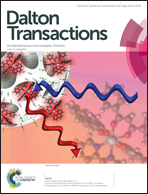Synthesis and structures of bis-ligated zinc complexes supported by tridentate ketoimines that initiate l-lactide polymerization†
Abstract
Eight bis-ligated, homoleptic, zinc complexes were synthesized through the reaction of NNO Schiff base ketoimines bearing varying substituents with diethyl zinc in an inert atmosphere glovebox at room temperature and isolated in 62–95% yield. The complexes were characterized with 1H, 13C, and 19F nuclear magnetic resonance spectroscopy, absorbance spectroscopy, high resolution mass spectrometry, elemental analysis, and single crystal X-ray crystallography. The complexes were shown to adopt distorted octahedral coordination geometry around zinc. The 1H and 19F NMR spectra of complexes 1–7 showed stable zinc coordination at 300 K while the effect of steric encumbrance and two trifluoromethyl groups in complex 8 was investigated with variable temperature NMR. The bis-ligated zinc complexes were effective initiators for the ring opening polymerization of L-lactide into poly-L-lactic acid (PLLA). With [L-lac]/[Zn complex] = 50, the bis-ligated zinc complexes yielded percentage conversion of 14–98% with polymerization times varying from 15–1440 min, where the longest reaction times were required when two trifluoromethyl groups were present. The addition of 4-fluorophenol co-catalyst resulted in up to a 5-fold increase in the percentage conversion in toluene solution and up to a 14-fold increase in bulk melt polymerization with reductions in the poly-dispersity index values for the isolated PLLA. Addition of 4-fluorophenol to complex 1 was studied with 1H and 19F NMR and appeared to yield an in situ generated zinc alkoxide complex.


 Please wait while we load your content...
Please wait while we load your content...